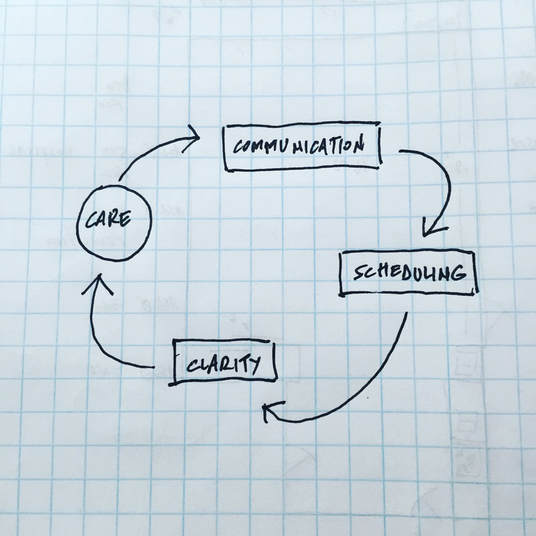 Scheduling is part of clarity, consistency & accountability. Scheduling is part of clarity, consistency & accountability. Winning habits aren't always the most complex. Enhance clarity to build consistency and establish accountability through the simple discipline of scheduling. Scheduling is the process of having a plan, or at least attempting to tell you day how you think it should go. Writing down your goals is important to do on the macro level of having a life plan, on the annual level of mapping out your course and on the micro level of having a daily road map. There is something special that happens when we take the time to write things down, there is some connection between the engagement of the brain and the enabling of the will that is connected to committing something to your calendar. Read more on the stories of successful people who are in the habit of writing down their goals, HERE. Scheduling yourself the day prior or early in the morning enables you to be ahead of your day before the chaos hits and the day takes on a mind of it’s own. If you don't schedule ahead, you will always be playing from behind. You never want to get behind, as we all know - that's where the farts are. Whether you schedule in blocks of time or are down to the minute, prioritization (more) starts with having a target. Real Estate mogul and Shark Tank star, Barbara Cocoran, swears by her daily to-do list which she hand writes every night, prioritizes with a simple rating system and emails to her personal assistant for accountability. In an interview with Inc. Magazine Barbara outlines her process, “I rate the items in order of importance: A, B, or C. The A's are where the gold is. These are the things that will move my business ahead and make me money. I find there are really only three to five A items on any given day, and I do those first.” Goal setting is a muscle that must be worked out on the daily, it requires mental strength, it will test your will power and it is enhanced by accountability from others. Setting aside time in your day to prepare yourself can be as simple as the habit of writing down your schedule. Organization in this way becomes a powerful habit that will help you to make gains on the items that are important to you. Like budgeting for your finances, a good plan will assist you to spend your time (which is impossible to recoup) where it is needed rather than be in a vicious cycle of questioning where the time went at the end of your day. Making your schedule visible to yourself and your team members creates a level of accountability as well as demonstrates leadership by example (more). Vince Lombardi has a great saying, “The will to win is not nearly so important as the will to prepare to win.” Who doesn’t want to win? Yet the thing that separates those who achieve success from those who talk about it is found in the preparation that winners put in. Those hours of discipline do not happen by accident, they come with a commitment to schedule in time for the things that are important, to prioritize and to persevere through the pain. Organization can be painful or just plain overlooked by many, but a successful system does not have to be complex to be effective. In terms of property restoration every production manager knows that our schedules have to be constructed with a certain amount of flexibility in them for those inevitable calls for emergency services from water or fire related damages. Drafting a schedule the day prior and making the plan visible for the team (more) are key to communicating that leadership respects the team and is committed to helping them to be prepared for the upcoming needs of our clients. Scheduling is a core communication component that shows our employees we care about them and creates a visible game plan through which we are able to communicate effectively with our clients as well (more). The discipline of scheduling your self should carry into the care of scheduling the team and the courtesy of communicating those schedules to our clients. The will to prepare to win starts with personal habits that translate into organizational systems that guide our core professional services. Being organized forces us to care about and budget our time. Scheduling generates habits that position us to pursue our goals with clarity, consistency and accountability. Simple things can be the difference between long term success (more) and cycles of chaos. Organizational truth: Don’t get behind, that’s where the farts are. References: More from Barbara Cocoran in her interview with Inc. Magazine, including video - https://www.inc.com/magazine/201704/anna-hensel/day-in-the-life-barbara-corcoran.html
0 Comments
Leave a Reply. |
AuthorThoughts on personal and professional development. Jon Isaacson, The Intentional Restorer, is a contractor, author, and host of The DYOJO Podcast. The goal of The DYOJO is to help growth-minded restoration professionals shorten their DANG learning curve for personal and professional development. You can watch The DYOJO Podcast on YouTube on Thursdays or listen on your favorite podcast platform.
Archives
March 2023
Categories
All
<script type="text/javascript" src="//downloads.mailchimp.com/js/signup-forms/popup/unique-methods/embed.js" data-dojo-config="usePlainJson: true, isDebug: false"></script><script type="text/javascript">window.dojoRequire(["mojo/signup-forms/Loader"], function(L) { L.start({"baseUrl":"mc.us5.list-manage.com","uuid":"b9016446bd3c6a9f0bd835d4e","lid":"83282ffb9e","uniqueMethods":true}) })</script>
|
Jon Isaacson |
Connect. Collaborate. Conquer.
© COPYRIGHT 2015. ALL RIGHTS RESERVED.
|



 RSS Feed
RSS Feed